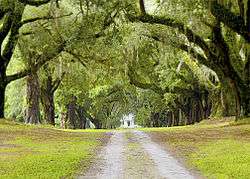Mansfield Plantation
Mansfield Plantation is a well-preserved antebellum rice plantation, established in 1718 on the banks of the Black River in historic Georgetown County, South Carolina.[2][3]
Mansfield Plantation | |
 The "Avenue of Oaks" approach to Mansfield Plantation | |
  | |
| Location | In Georgetown County, South Carolina. 5 miles north of Georgetown, off U.S. Route 701. |
|---|---|
| Coordinates | 33°26′5″N 79°15′33″W |
| Area | 55 acres (22 ha) |
| NRHP reference No. | 77001223 [1] |
| Added to NRHP | December 06, 1977 |
History
Spanning nearly 1,000 acres (4.0 km2) of pine forest, rice fields and cypress swamps, Mansfield Plantation was once one of the largest rice producing plantation in the country. Mansfield, along with adjacent rice plantations up and down the Black River, provided much of Europe with "Carolina Gold" rice during the late 18th and early 19th centuries.
Rice growing was made possible by:
- perfecting irrigation techniques using tidal water and manmade dykes.
- experimentation with natural fertilizers.
- most notably, African-American slave labor.
After the American Civil War, rice production became too expensive and soon the plantations fell into bankruptcy and were sold off to new owners.
Present day
Today, Mansfield Plantation is preserved as an authentic rice plantation, complete with the original plantation home, a school house, live oak avenue ("oak allée"), chapel, guest house, and grounds. It also has the only remaining winnowing barn in Georgetown County, where rice grains were processed for shipment.
Restoration
Undergoing restoration is a slave village of 7 slave cabins and a chapel.[4]
In 2009, the entire plantation underwent a privately funded, massive restoration project to keep its distinct history alive for generations to come. It is said to be the only American plantation saved from development and reclaimed by a direct descendant of the original owners.
Media
Mansfield Plantation has been featured in numerous films, documentaries and television shows. It served as the backdrop for scenes from Mel Gibson's 2000 film, The Patriot.[5] In 2006, the Fox network filmed two segments of their primetime television series Treasure Hunters at Mansfield and the Fine Living Network filmed a documentary at Mansfield Plantation for their television series Windshield America.
See also
- National Register of Historic Places listings in Georgetown County, South Carolina
- Plantations in South Carolina
Gallery
- Views of Mansfield Plantation
 The main house decorated for the holidays
The main house decorated for the holidays Mansfield's winnowing barn
Mansfield's winnowing barn The Old Kitchen Guest House, now a bed and breakfast
The Old Kitchen Guest House, now a bed and breakfast The old slave village, currently undergoing restoration
The old slave village, currently undergoing restoration
References
- "National Register Information System". National Register of Historic Places. National Park Service. April 15, 2008.
- McNulty, Kappy; Kathy Hendrix (March 10, 1977). "Mansfield Plantation" (pdf). National Register of Historic Places - Nomination and Inventory. Retrieved 7 July 2012.
- "Mansfield Plantation, Georgetown County (off S.C. Sec. Rd. 431, Georgetown vicinity)". National Register Properties in South Carolina. South Carolina Department of Archives and History. Retrieved 7 July 2012.
- Slave cabin/chapel restoration project
- "Movies Filmed in South Carolina – The Patriot". South Carolina Information Highway. SCIway.net. 2009. Retrieved 2009-03-28.
- Agnes Baldwin; N. Jane Iseley; William P. Baldwin (1983). Plantations of the Low Country: South Carolina 1697-1865 (Rev. ed.). Legacy Pubns.
- Alberta Morel Lachicotte (1989). Georgetown Rice Plantations. Reprint Co.
- Suzanne Cameron Linder (2001). Historical Atlas of the Rice Plantations of Georgetown County and the Santee River. South Carolina Department of Archives and History for the Historic Ricefields Association, Inc.
External links
| Wikimedia Commons has media related to Mansfield Plantation (Georgetown, South Carolina). |
- Mansfieldplantation.com: Official Mansfield Plantation website
- Mansfieldplantation.com: Interactive plantation map
- Mansfield Plantation Photos & History
- NPS.org: When Rice Was King — a National Park Service Teaching with Historic Places (TwHP) lesson plan.
- Historic American Buildings Survey (HABS) No. SC-476, "Mansfield Plantation, U.S. Route 701 vicinity, Georgetown, Georgetown County, SC", 4 photos, 1 photo caption page
- Historic American Buildings Survey (HABS) No. SC-476-A, "Mansfield Plantation, Winnowing House, U.S. Route 701 vicinity, Georgetown, Georgetown County, SC", 1 photo, 1 photo caption page
- Historic American Buildings Survey (HABS) No. SC-476-B, "Mansfield Plantation, Rice Threshing Mill, U.S. Route 701 vicinity, Georgetown, Georgetown County, SC", 6 photos, 1 photo caption page
- Historic American Buildings Survey (HABS) No. SC-476-C, "Mansfield Plantation, Schoolhouse, U.S. Route 701 vicinity, Georgetown, Georgetown County, SC", 1 photo, 1 photo caption page
- Historic American Buildings Survey (HABS) No. SC-476-D, "Mansfield Plantation, Slave Quarters, U.S. Route 701 vicinity, Georgetown, Georgetown County, SC", 3 photos, 1 photo caption page

